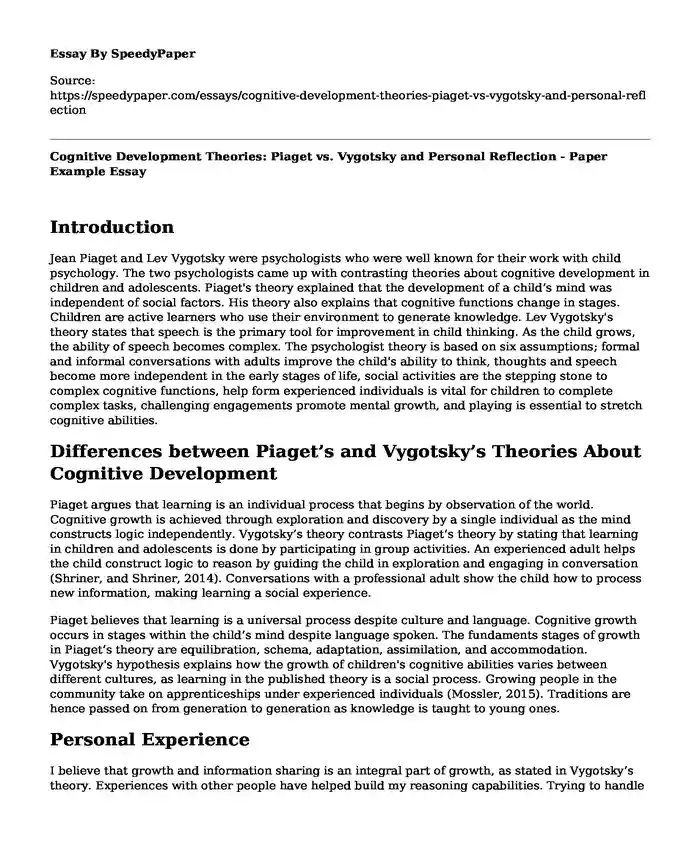
| Type of paper: | Essay |
| Categories: | Development Human development Cognitive development |
| Pages: | 3 |
| Wordcount: | 582 words |
Introduction
Jean Piaget and Lev Vygotsky were psychologists who were well known for their work with child psychology. The two psychologists came up with contrasting theories about cognitive development in children and adolescents. Piaget's theory explained that the development of a child’s mind was independent of social factors. His theory also explains that cognitive functions change in stages. Children are active learners who use their environment to generate knowledge. Lev Vygotsky's theory states that speech is the primary tool for improvement in child thinking. As the child grows, the ability of speech becomes complex. The psychologist theory is based on six assumptions; formal and informal conversations with adults improve the child's ability to think, thoughts and speech become more independent in the early stages of life, social activities are the stepping stone to complex cognitive functions, help form experienced individuals is vital for children to complete complex tasks, challenging engagements promote mental growth, and playing is essential to stretch cognitive abilities.
Differences between Piaget’s and Vygotsky’s Theories About Cognitive Development
Piaget argues that learning is an individual process that begins by observation of the world. Cognitive growth is achieved through exploration and discovery by a single individual as the mind constructs logic independently. Vygotsky’s theory contrasts Piaget’s theory by stating that learning in children and adolescents is done by participating in group activities. An experienced adult helps the child construct logic to reason by guiding the child in exploration and engaging in conversation (Shriner, and Shriner, 2014). Conversations with a professional adult show the child how to process new information, making learning a social experience.
Piaget believes that learning is a universal process despite culture and language. Cognitive growth occurs in stages within the child’s mind despite language spoken. The fundaments stages of growth in Piaget’s theory are equilibration, schema, adaptation, assimilation, and accommodation. Vygotsky's hypothesis explains how the growth of children's cognitive abilities varies between different cultures, as learning in the published theory is a social process. Growing people in the community take on apprenticeships under experienced individuals (Mossler, 2015). Traditions are hence passed on from generation to generation as knowledge is taught to young ones.
Personal Experience
I believe that growth and information sharing is an integral part of growth, as stated in Vygotsky’s theory. Experiences with other people have helped build my reasoning capabilities. Trying to handle difficult situations with my peers and watching older experienced people work through life has granted me the ability to solve difficult problems independently. If I were left to discover things on my own, I would not have the same knowledge as I do now. When you talk to people or listen to their advice, their experiences become your own by learning from mistakes or referencing where a successful task was completed. For example, I would not have navigated through my first years of college easily without listening to advice from people who already experienced it.
Conclusion
The two psychologists had depth explanations of how a child's mind develops. The varying theories were held in high regard. The two ideas split the world's understanding of cognitive development. Since none of the theories have been definitively proven, personal experience mainly determines the theory that an individual supports.
References
Mossler, R. (2015). Child and Adolescent Development. ePub Development: M & R Consultants Corporation. Second Edition.
Shriner, B. and Shriner, M. (2014). Essentials of Lifespan Development: A Topical Approach. ISBN-13: 978-1-62178-169-1
Cite this page
Cognitive Development Theories: Piaget vs. Vygotsky and Personal Reflection - Paper Example. (2024, Jan 06). Retrieved from https://speedypaper.net/essays/cognitive-development-theories-piaget-vs-vygotsky-and-personal-reflection
Request Removal
If you are the original author of this essay and no longer wish to have it published on the SpeedyPaper website, please click below to request its removal:
- Learn More about Preschoolers and Nutrition in Our Essay
- Lifespan Development Paper Sample
- Free Essay Example. Mindset and Bias
- Free Essay. Self-Advocacy and Communication with Family
- Free Essay Example - Flynn Effect
- Paper Example. How Domestic Violence Influence the Development of Children
- Infants' Innate Language Learning: Beyond the Environment - Essay Sample
Popular categories




